completeGithub: false
completeReflection: false
completeHypothesis: false
storytellingDone: false
computationDone: false
playfulnessDone: false
mySkill: 1
config.header.left: "HIST3812 Fall 2022 Carleton University Dr. Graham."
config.header.right: "Experiences: {mySkill}"
--
# HIST3812|DIGH3812
## Playful Engagement with the Past
You approach the door of PA 406 with some trepidation. You've never encountered a class like this before. <i> It's supposed to be about digital history, whatever that is! What's this 'playful engagement' stuff? Weird</i>
You go to knock, but you see the door is half open already. Inside, a cluttered office, a wingback chair, and lots of <i>stuff</i> on the shelves and the floor.
'Hey, come on in' says the balding man at the standing desk...
---
### What _is_ this?
+ <b>When you see bulletted text in the narrative some of which is underlined, clicking on that text will change the sentence, to enable you to better describe YOUR perspective. Click until you find a sentence that is true for you. These sentences are always marked with bullet points.</b>
Elsewhere in the narrative, the link behind underlined text will take you to an altogether new passage of text. Green links will open a new window going to a website to provide you with more context
When you get to the end, copy and paste everything into a new email; send it to shawn.graham@carleton.ca. Do this by September 12, please.
<blockquote>
<i><b>NB</b> This experience is made with <a href="https://twinery.org" target="_blank" style="color: green;">Twine</a> and it saves its state - your answers - in your browser. I don't see these responses. The story will use these answers, plus how you react to subsequent prompts, to put together a gently-customized experience that </i>should<i> help you get set up to make the most out of this course. Remember, anything underlined in red either takes you to a new passage or changes the text in meaningful ways. Roll with it.</i>
</blockquote>
___
..."C'mon, c'mon in!" he says. You [[take a deep breath...|personalSurvey]][if passage.visits == 2]
"Ah, you're back!"
"Hey, c'mon in, don't worry, I'm just fighting with the machine again. I've had to confess on Twitter that I'm not sure how to do something, and people are sending me suggestions. It'll work. Eventually."
He gestures towards the big blue chair, and you sit down.
[if passage.visits == 1]
...and step inside, a bit hesitant. You can see the prof better now, a mildly balding man, standing at his desk, clearly frustrated by whatever the computer is *not* doing.
He gestures towards the big blue chair, and you sit down.
"So... you're about to start HIST3812, eh? Good choice, good choice! You're here for the tutorial level, eh?"
[continue]
<b>You say... </b>
+ "My experience with digital technologies has {cycling link for: 'experiencePrompt', choices: ['been limited to', 'sometimes involved a bit more than', 'gone far beyond']} writing essays.
+ I am {cycling link for: 'attitudePrompt', choices: ['ok with', 'made nervous by', 'terrified by']} the thought of admitting to a prof or my peers that something hasn't worked, that I might not know how to do something.
+ I have {cycling link for: 'guiPrompt', choices: ['never', 'sometimes', 'frequently']} used menu based or GUI point-and-click software to make creative digital things.
+ I would say that I am {cycling link for: 'skillPrompt', choices: ['not often', 'sometimes', 'frequently']} able to pick up new technologies easily.
+ I have {cycling link for: 'commandPrompt', choices: ['never', 'sometimes', 'frequently']} used the command prompt.
+ I have {cycling link for: 'dataPrompt', choices: ['never', 'sometimes', 'often']} used APIs to obtain historical data.
+ So, to sum it up, I am {cycling link for: 'outlookPrompt', choices: ['excited but nervous', 'quietly terrified', 'ready for anything']} I guess!"
He nods. "[[Good, good! Let's give you a sense of what you're in for|make a note]]!"
[if passage.visits == 1]
"I'm glad you shared that with me. We're going to have some fun here. You've looked at the course website, eh?
First thing we're going to do is get a big ticket overview of the logic of how the course is organized, and then I'm going to ask you to do one or two things.
There's three broad pieces- [[a module on storytelling|storytelling]], a consideration of what '[[play|playfulness]]' means for historians, and then we'll factor in what happens when [[a non-human referree|computation]] gets involved. Where do you want to start?"
[if passage.visits == 2 && computationDone == true && storytellingDone == false]
What else.. [[a module on storytelling|storytelling]], and a consideration of what '[[play|playfulness]]' means for historians.
[if passage.visits == 2 && playfulnessDone == true && storytellingDone == false]
There's.. [[a module on storytelling|storytelling]], and we'll factor in what happens when [[a non-human referree|computation]] gets involved.
[if passage.visits == 2 && storytellingDone == true && computationDone == false]
Um.. Let's talk about '[[play|playfulness]]' means for historians, or what happens when [[a non-human referree|computation]] gets involved.
[if passage.visits == 3 && playfulnessDone == true && computationDone == true]
Right, I think that leaves [[storytelling]] to discuss.
[if passage.visits == 3 && playfulnessDone == true && storytellingDone == true]
I think that leaves [[computation]] for us to discuss.
[if passage.visits == 3 && computationDone == true && storytellingDone == true]
It's important that we come up with a theory of [[play|playfulness]] if we're going to talk about 'creative engagement'.
[if passage.visits == 4]
<i>"Excellent, ok, let's get cracking on setting up your [[github]] accounts."</i>
[if passage.visits == 5]
<i>"Hmm... what else. Ah, right, let's talk about [[reflections and logs]]."</i>
[if passage.visits == 6]
<i>"Oh, yes, there's a lot of material I want you to read and digest as you come to class in a given week. No reason to do that on your own, so let's get [[hypothesis]] working for you."</i>
[if passage.visits == 7]
Alright! I think that's everything. Oh, now that you've seen something of the logic of this class, and you've gotten some of the moving pieces sorted out, maybe you could tell me something about [[what you hope to get out of this course]]? "</i>
storytellingDone: true
--
"Storytelling... when did you last read an academic paper for pleasure, eh? But sometimes, we do. Sometimes, we encounter really compelling work. We at least have an excuse for reading academic literature. But maybe we could tell those compelling stories in different venues. I want to understand what a 'good story' looks like that is _also_ good history."
He pushes a book into your hands.
"Like some of the stuff in <a href="https://ocul-crl.primo.exlibrisgroup.com/permalink/01OCUL_CRL/hgdufh/alma991022942527505153" target=_blank style="color: green;"> here</a>".
> [[You click through, glance quickly at the title, and nod. "Alright."|choicesHub]] playfulnessDone: true
--
"Homo Ludens, that's what <a href="https://ocul-crl.primo.exlibrisgroup.com/permalink/01OCUL_CRL/hgdufh/alma991022942527505153" target=_blank style="color: green;">Johan Huizinga</a> called it. I like Ramsay's phrase, <a href="https://www.fulcrum.org/epubs/8910jv458?locale=en#/6/28[chapter05]!/4/1:0" target=_blank style="color: green;"> 'the screwmeneutical imperative'.</a>. Playfulness is more than merely playing at things, screwing around with things. It's trying things out. It's being open to the workings of chance and serendipity. It's a willingness to tinker, to confound, to leave gaps for someone else to try to fill..."
He stops, cleans his glasses, and continues.
"Well. I've been in this space since about 2006 and I'm still trying to figure it all out. Quick, word association: I say playfulness in history, you say...?
{text input for: 'playfulness-association'}
[['Hmm. Interesting. Interesting!|choicesHub]] computationDone: true
--
"It's quite possible, you know, to do the big-ticket things we want to do here, the thinking-about-playful-engagement-in-history, completely _without_ using a computer at all. When you play a board game, ever come up with house rules? You do that because you've looked at the rules, you've thought about how the represent a world, you've found fault and you've come up with something better."
He grins.
"You have, in fact, critiqued the code of the underlying simulation and re-written it. You've thought digitally. We'll just formalize that a bit."
[["Oh", you say.|choicesHub]] completeGithub: true
--
Note:
[typewriter 25]
Github is a code sharing website often used by digital historians. ‘Git’ is a program that takes snapshots of the current state of a folder, and stores them in sequence, allowing you to revert your changes to an earlier state. It also allows you to create branches, or duplicates of your folder, so you can experiment. If you like the results of your work, you can merge that branch back into your original.
[if mySkill <= 4]
"It sounds to me like you're a little bit anxious about all of this. That's ok. We'll take our time." He turned to his computer, and fired up the browser.
[["A bit, I guess", you say|githbub-2-gentle]]
[if mySkill > 4]
"Sounds to me, from what you've said, that you've got a bit of experience with doing this sort of thing. Github is where a lot of digital history code and data is shared; there are other such repositories. It allows for version control, and it allows someone else to copy or contribute to your code"
[["Right, gotcha. You want me to set that up then?|github-2-complex]]
Dr. Graham peers at you over his glasses. "Now..You said that you are {attitudePrompt} the thought of admitting to a prof or my peers that something hasn’t worked, that you might not know how to do something."
+ "That's right. It feels {cycling link for: 'feeling', choices: ['a bit weird', '...different...', 'maybe exciting?']} to do that."
He nods.
"The idea is that if I get you habituated to asking for help, or freely helping others, or examining in your own writing what has worked and what hasn't, you'll move into that zone where **real** learning happens."
"Some people call it <a href="https://en.wikipedia.org/wiki/Flow_(psychology)" target=_blank style="color: green;">flow</a>."
"Anyway, let's [[give it a try|reflection-demo]]."I find that annotating what I read is really hard to do. But when I _do_ do it, I retain and understand more. And reading stuff that's already digital? I find it hard to keep my attention going. So I use <a href="https://hypothes.is"> target=_blank style="color: green;">Hypothesis</a>. It allows us to have a kind of distributed reading group. Go to Hypothesis now and sign up for an account. Then, <a href="https://hypothes.is/groups/MP67BLk7/hist3812" target=_blank style="color: green;">join this reading group</a>."
"Now, when you're reading pdfs or webpages, most of the time, Hypothesis can add a reading layer on top of that. If someone else has annotated the page, you can see what they have highlighted or annotated. This helps focus your attention. You can respond to their comment, make a new one, or just highlight things. <a href="https://web.hypothes.is/quick-start-guide-for-students/" target=_blank style="color: green;">To get the most out of it</a>, it helps to have a kind of rubric. Maybe use the 3ws - Weird, Wonderful, or Worrying - but there are other strategies. <a href="https://www.youtube.com/watch?v=MjSpol-oPm4" target=_blank style="color: green;">Here's a quick video to orient you.</a>"
"So... what's your hypothesis username?"
{text input for: 'hypothesisUsername'}
>[["Ok. What's next?", you say.|choicesHub]] "Y'know" he murmurs, "I've never liked the idea of 'syllabus-as-a-contract'. If you notice, on the website for the course, I have a brief paragraph about that. You might take a look at it, and if you agree, add 'I agree to the contract!' as an annotation in our class reading group."
[if mySkill > 4]
"You have indicated that you are quietly confident about the work you're about to do. Excellent - I am going to expect you to take a bit of a leadership role, and help others when you can. **Digital history is a team sport!**" he laughed.
[if mySkill <= 4]
"You've indicated to me that you're maybe a bit hesitant about this whole digital-history thing, that while you might feel ok in some areas, you're a bit nervous in others. That's ok. Digital history is a team sport, and I expect you to be ok with saying when you need help, when things aren't coming together."
He continued. "I absolutely DO NOT WANT you to go this alone. No heroic lone scholars! I just ask that you acknowledge any help you recieve - or give - along the way. Now.... ".
He hands you a sheet of paper. <i>"Copy that to an email. Send it to me, ok? See you in class on Sept 12."</i>
---
## Tutorial Results:
[if mySkill <= 4]
<i>I am a bit hesitant about all this</i>
[if mySkill > 4]
<i>I think I'll be ok with all of this</i>
[continue]
If I had to select some keywords to describe my aim for this course, they would be: {myAim}.
When I think about 'playfulness', the words that come to mind are: {playfulness-association}
My github username is {githubUsername}.
The URL to the practice reflection I made is {reflectionURL}.
On Hypothesis, my username is {hypothesisUsername}.
I would like {cycling link for: 'finalPrompt', choices: ['to meet with you in person', 'a bit more clarification about some things via email', 'some help in configuring my computer']} please.
---
[["Now. Don't forget to email me that material - shawn.graham@carleton.ca. One last thing", he says...|The End]] mySkill (guiPrompt == 'sometimes'): mySkill + 1
mySkill (guiPrompt == 'frequently'): mySkill + 2
mySkill (skillPrompt == 'sometimes'): mySkill + 1
mySkill (skillPrompt == 'frequently'): mySkill + 2
mySkill (commandPrompt == 'sometimes'): mySkill + 1
mySkill (commandPrompt == 'frequently'): mySkill + 2
mySkill (dataPrompt == 'sometimes'): mySkill + 1
mySkill (dataPrompt == 'often'): mySkill + 2
mySkill (experiencePrompt == 'been limited to'): mySkill - 1
--
"Oh, wait, let me make a note of what you just said... [[alright|choicesHub]]."
You take a moment to think. When has anyone ever asked you that?
"It's ok - just gimme a few words, word-association style."
You say... {text input for: 'myAim'}
He nods, and then his printer starts spitting out text. He looks down at it, nods again, and hands it to you [[before you go|results]].You're done. You can close this tab. ;)
### Colophon
If you want to know how I built this - it uses <a href="https://twinery.org" target=_blank style="color: green;">Twine</a> and the <a href="https://klembot.github.io/chapbook/guide/index.html" target=_blank style="color: green;">Chapbook story format</a>. If you go back to the <a href="https://hist3812.netlify.app/syllabus/" target=_blank style="color: green;">course website</a> you can right-click and 'save link as' to download the tutorial. Then, on the Twine editor (which you can use from the Twinery website), you can import it to see the underlying code.
You might find the way the experience uses simple variables and counters useful for creating your own experiences - but remember, story format matters. What works with one Twine format doesn't necessarily work with another.
- Dr. GrahammySkill: mySkill + 1
--

"First thing's First. Open this link here in a new window (right-click, select open new link in a new tab."
<a href="https://github.com" target=_blank style="color: green;">Github.com</a>
"Start by putting your Carleton email into that white box, and then follow all the prompts. You'll have to do a verification email thing (where they send you an email, you click on a link etc). Choose a username that is sensible. **It can be a pseudonym** - it doesn't have to have any obvious connection with your real name. Eventually you'll end up at a page that looks like this:
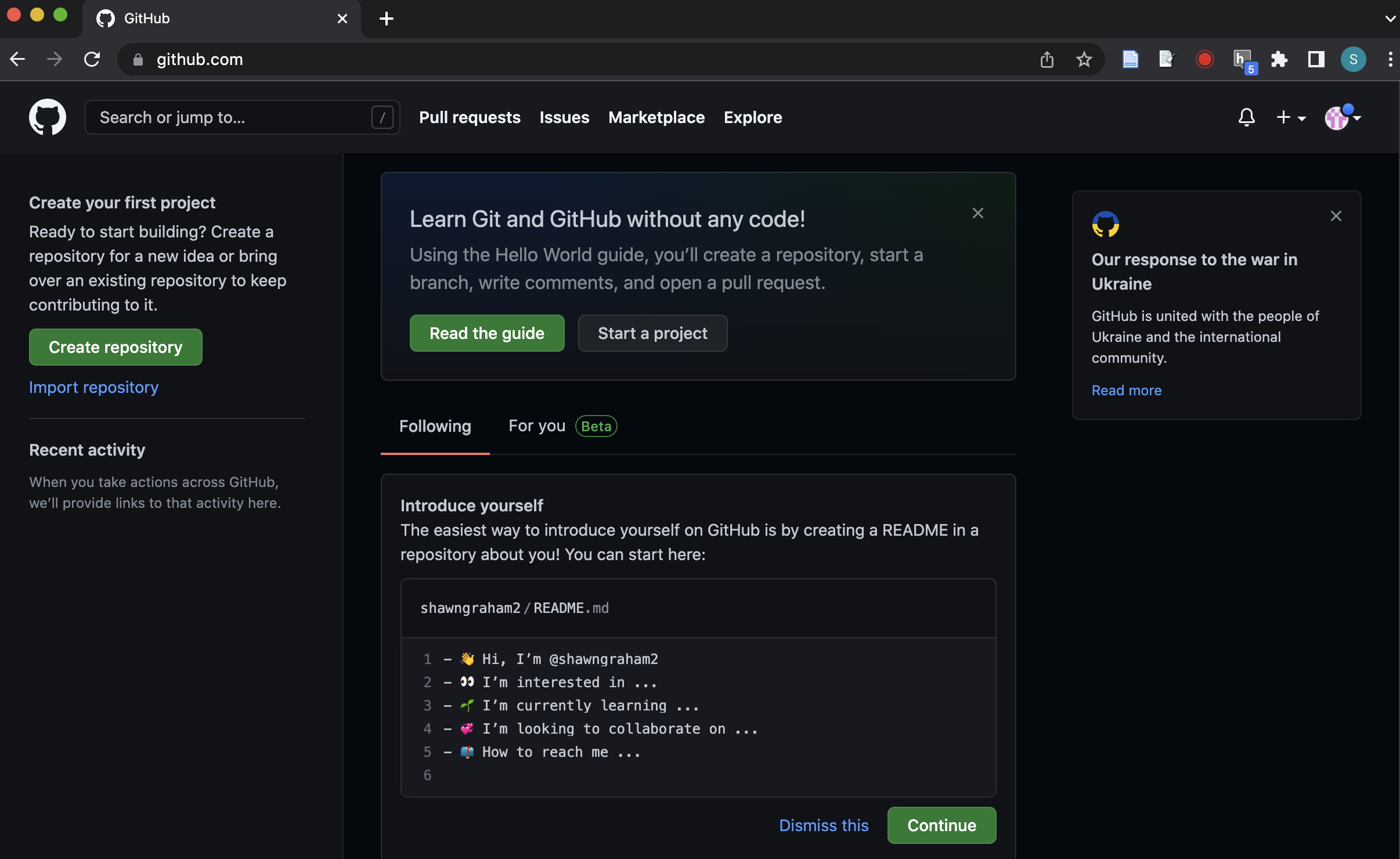
Your user page is at github.com/the-name-you-chose and your it will look like this:
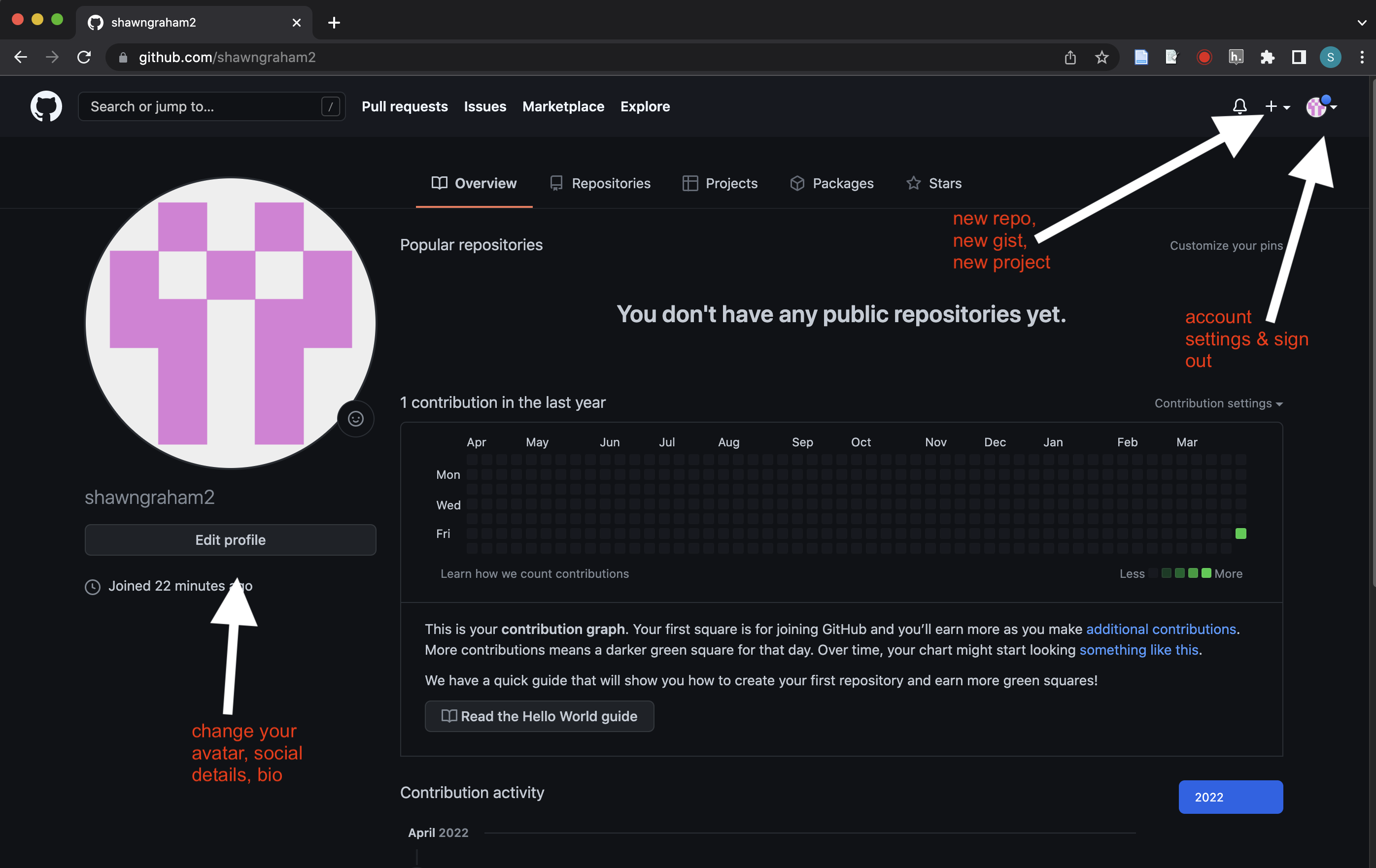
Done all that? Great - give me your githubusername, the full URL please:"
{text input for: 'githubUsername'}
You paste it in [[and say "ok, what's next?"|github-3-gentle]]mySkill: mySkill + 3
--
"I need you to go to <a href="https://github.com" target=_blank style="color: green;"> Github.com </a> and set up a new repo for this course. Ever done that before? Pretty straightforward if you follow the prompts and read closely."
"Choose a sensible username. Doesn't have to be your real name, or even anything closely associated. I'd suggest you call your repo something like 'hist3812-materials'. We'll be using this repo _a lot_ over the course of the term."
"Add me as a collaborator; my username is `shawngraham` and my avatar is a yellow minion."
"If you run into difficulties, <a href="https://craftingdh.netlify.app/tutorials/github/" target=_blank style="color: green;">this page from my other course website will sort you out</a>.
You set down to work. Dr. Graham interrupts from time to time to ask:
"Done all that? Great - give me your githubusername, the full URL please:"
{text input for: 'githubUsername'}
After a few more moments, [[you're all sorted out|choicesHub]].mySkill: mySkill + 1
--
"Right - if you're on the main github.com page, click that green 'create new repository' button. I can't see your screen. Are you on that? If you're on your user page, click the + button and select ‘new repo’. We're going to make a 'repository' - or folder - to store your course materials in. It'll be empty for now, but we'll fill it up later.
Give your new repo a reasonable name, something like 'hist3812-materials' would be fine; tick the ‘private’ box; tick the ‘initialize with a readme’ box, and hit the green create button:
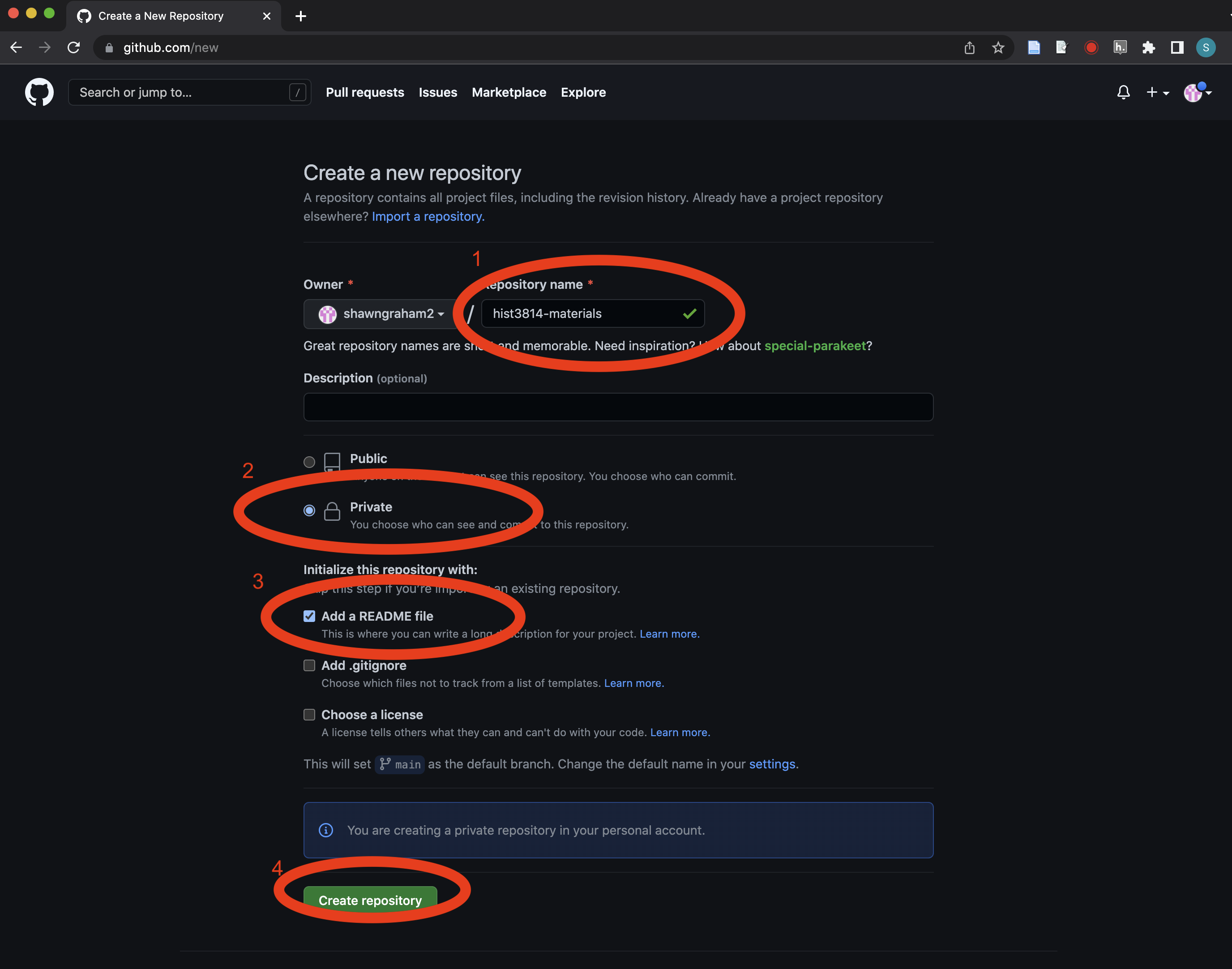
[[You say "Gotcha... ok, done."|github-4-gentle]]mySkill: mySkill + 1
--
"One last thing" he says, "you need to add me as a collaborator, or else I won't be able to see your work."
"What if I made it public? Would anyone be able to see it?"
"Yes- but I think it's best if you kept everything private for now. There might be times later in the course where you'll make a new repo, and it'll be public, but don't worry about that now. So... here's what you need to know:"
He turns his screen so you can see it. "Hit the **settings** icon, the cogwheel thing, and then choose the collaborators page."
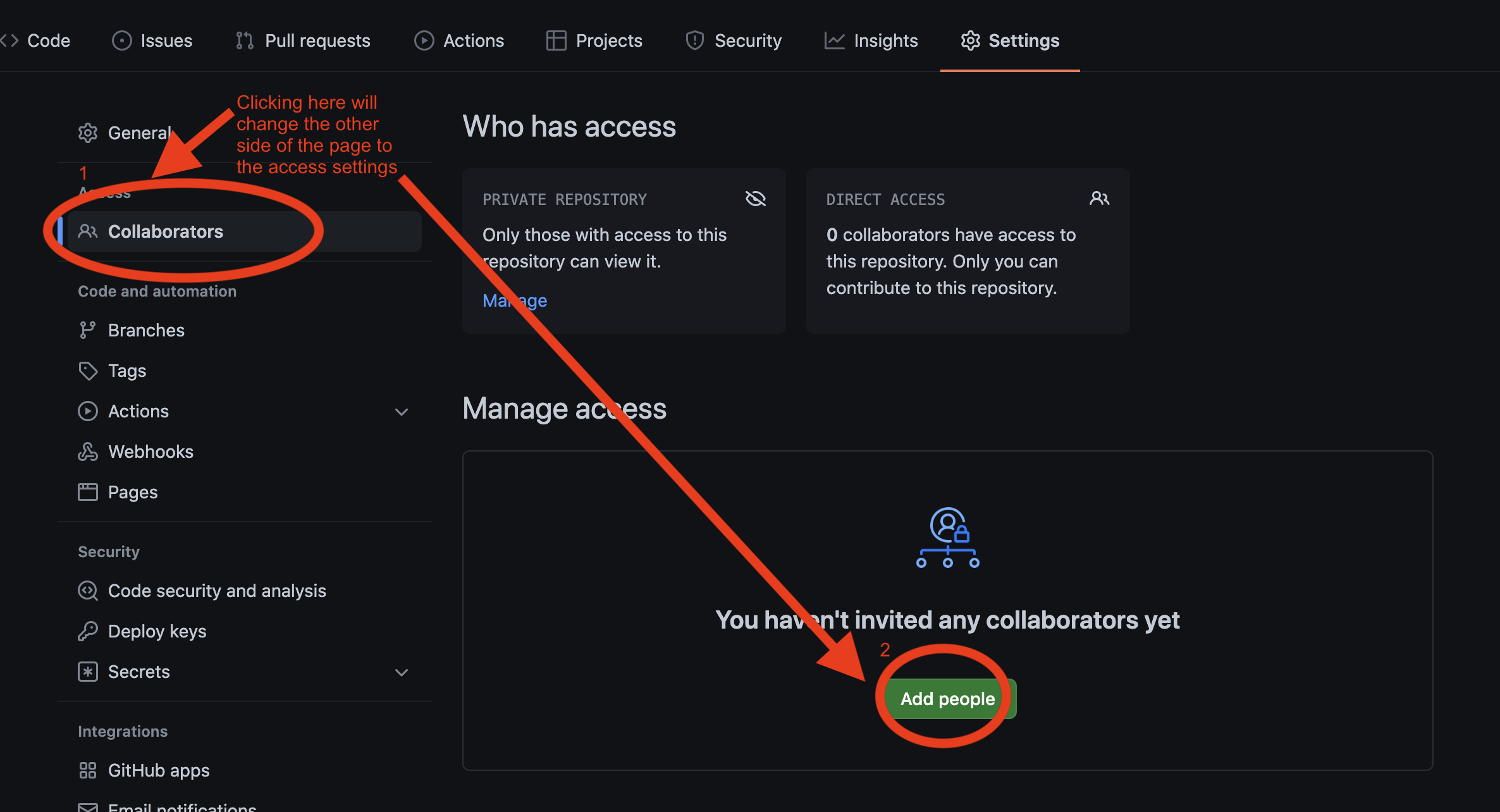
"...and add me:"
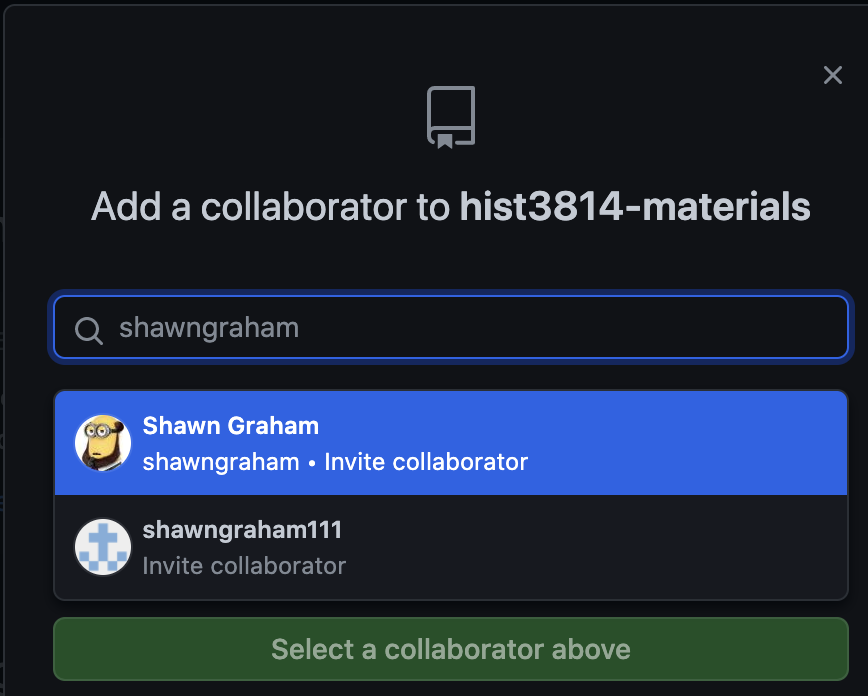
"You don't look much like a Minion", you say.
"Yes, but I'm nearly as bald as one."
>[[You try not to smile.|choicesHub]]
"I want you to go over to your github repo, and make a new file there:"

"The new file screen will open and the cursor will be blinking in the box where you write the filename. **When you make a new markdown text file remember to always use .md as the file extension in the name**."
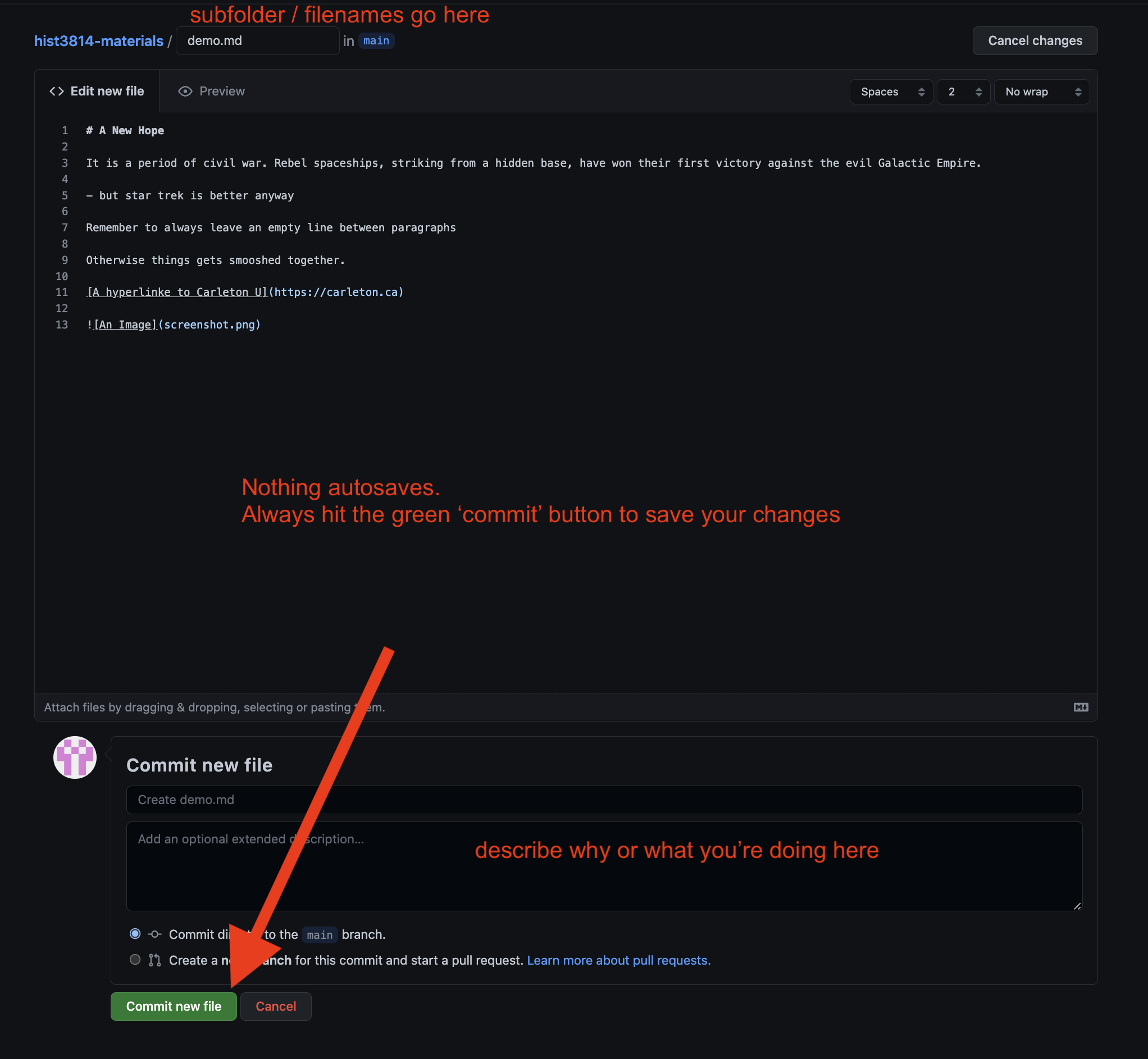
Now, in that new file, I want you to use <a href="https://guides.github.com/features/mastering-markdown/" target=_blank style="color: green;">Markdown conventions</a> to indicate things like headers, bullets, links, and so on. In Markdown, you also have to leave an empty line between paragraphs.
[["Ok", you say, "but what do I _put_ in this file?"|reflection-demo2]]
"Good question. A reflection, for our purposes here, ties what you've read to what you've done. It cites the relevant literature (use harvard author:date) and tries to answer the question, 'why does this matter?'. So, in that new file you've just made, give me three lines about 'Why does this tutorial level matter?'. Draw on the course website (make links to the relevant pages) or any of the literature I've given you so far.
"Don't spend too much time on it: the point is just to get you used to the mechanics of making a new file in Github. <a href="https://craftingdh.netlify.app/tutorials/github/#making-a-new-text-file-andor-a-folder-on-github" target=_blank style="color: green;">Here's a webpage from my other class that will remind you of all the steps if you need it.</a>"
"Now, once you've made that file and hit the green commit button, give me the URL to it here:
{text input for: 'reflectionURL'}
"When it comes time to submit your work, there's a google form on the course website that you can find either on the Schedule or the Assessment pages; in that form you'll give me the relevant URLs from your Github repos, as appropriate."
>[["So that's that. I think we're done this bit now|choicesHub]]